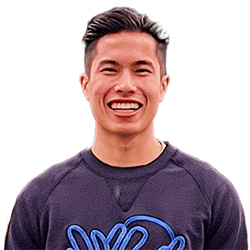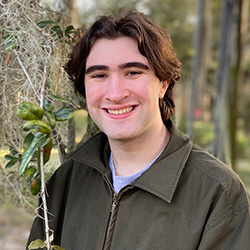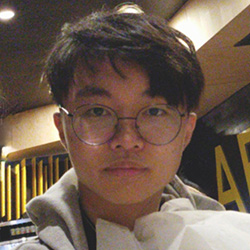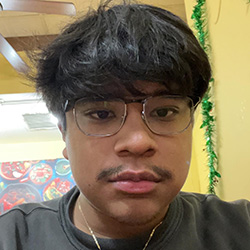Northwestern CS Announces Fall 2022 Outstanding Teaching Assistant and Peer Mentors
Quarterly department awards recognize exceptional service to the CS community
Each quarter, Northwestern CS honors and recognizes students who demonstrate excellence in computer science mentoring and teaching with Peter and Adrienne Barris Outstanding Teaching Assistant and Outstanding Peer Mentor awards.
Nominated by any member of the department for service to the CS community that goes beyond expectations, the teaching assistants and peer mentors work with faculty to deliver courses and support of the highest quality.
“Once again, our students have shown great initiative and abilities in providing a wonderful mentoring experience for all students — and we hope they will continue to inspire others,” said Samir Khuller, Peter and Adrienne Barris Chair of Computer Science at Northwestern Engineering. “This is only the tip of the iceberg, as these awards recognize a small subset of our wonderful community of TAs and Peer Mentors.”
Vaidehi Srinivas

“Vaidehi went above and beyond to provide students a more approachable angle for the challenging material in this class,” a nominator said. “She produced a thorough set of detailed and well-thought-out resources which were helpful to students and peer mentors alike — the former to better learn the material, and the latter to become more effective teachers.”
Srinivas is advised by Aravindan Vijayaraghavan, associate professor of computer science and (by courtesy) industrial engineering and management sciences at the McCormick School of Engineering.
She is interested in designing and analyzing simple algorithms that are practical for real-world input. Most recently, she is working on problems in theoretical machine learning related to minimizing an objective function using gradient descent. She described the scenario of rolling a ball down the graph of a function with the assumption that where the ball stops is the lowest function value.
“If the function is non-convex, the graph can have multiple dips or valleys, and the ball could have gotten stuck in the wrong one,” Srinivas said. “However, for many such functions that are used in practice, this doesn't really seem to happen. We are trying to find a theoretical explanation of this phenomenon.”
Before joining Northwestern, Srinivas was a Fulbright visiting student at the University of Vienna in the Theory and Applications of Algorithms Research Group. She earned a bachelor’s degree in computer science with a minor in German studies at Carnegie Mellon University.
Teaching assistants played an important role in her learning experience as an undergraduate student.
“Professors explain things at a high level, distilling the important ideas to help you see connections to other topics. Teaching assistants, who took the class more recently, explain things specifically, to help you do your homework today. Both play important roles in understanding concepts,” Srinivas said. “Algorithms and math are very challenging, and students often turn away from them entirely after struggling through early courses. It is important to show students that struggling is normal and that, with time, they are completely capable of learning the topics well and even liking the subject.”
Fall 2022 Outstanding Peer Mentors
The Northwestern CS peer mentor program is designed to ensure that students representing a range of computing backgrounds receive individual attention and real-time feedback.
Theerut Amornkasemwong

“Theerut Amornkasemwong understands the role of an educator better than most,” a nominator said. “Tee was able to see beyond the specifics and minutiae of assignments and get to the essence of the underlying learning goals.”
Amornkasemwong values the interactions and connections he made and how he gained a deeper understanding of the materials through cooperative learning and meaningful discussions with students.
“Peer mentors are learners just as much as the students in the course,” Amornkasemwong said. “As peer mentors, we are given the chance to revisit materials we have seen before, and to explore these materials from a new perspective.”
His research interests include the Internet of Things, embedded systems, and scalable software architectures.
“I spend a lot of time pulling apart and tinkering with electronic devices,” Amornkasemwong said. “I love exploring ways technologies can be integrated into the physical world, whether that be through automating mundane tasks or building seemingly useless but very fun gadgets.”
Amornkasemwong builds useful gadgets as well. At age 17, he invented a passive infrared (PIR) motion sensor device designed to aid people who are blind and visually impaired in navigating spaces through sound cues. He and his brothers launched the Seeing Sound project to provide devices for the Centre of Occupational Promotion for the Blind in Nonthaburi, Thailand.
Following graduation this spring, Amornkasemwong plans to pursue a career in software engineering at a tech company in the Bay Area.
Jack Burkhardt

“I view peer mentors as allies to students,” Burkhardt said. “We act as advocates for our peers and make sure the teaching staff understand the needs of their students.”
Burkhardt was recognized for his initiative and leadership in the COMP_SCI 376: Game Design and Development course.
“Jack acted as a de facto head teaching assistant for the class, coordinating the rest of the course staff, and helping navigate around various administrative and pedagogical blockers,” a nominator said. “Far from being a ‘behind the scenes’ leader, Jack also spent a lot of time on the front lines, setting records for answering questions on Discord and volunteering to teach extra class sessions on additional topics.”
Burkhardt’s current research focus centers around interactive entertainment, including art installations and video games. He examines the impact and biases of technologies through the context of race, gender, and sexuality, and the design of more equitable and ethical technology.
Last summer, Burkhardt’s data-driven, virtual reality-based art installation exploring the connection of space and marine debris, called “VastWaste,” was featured at the 20th Piksel Festival in Bergen, Norway; the 27th International Symposium of Electronic Art in Barcelona, Spain; and at SIGGRAPH Art Gallery in Vancouver, Canada.
“I enjoy teaching and helping students, so I appreciate that Professor [Ian] Horswill let the peer mentors have a lot of freedom, otherwise many of the things I was able to do this quarter would not have been possible,” Burkhardt said. “This award is a reassurance for me that the time and effort I put into the class was helpful for students' success, and that I should continue doing these same things for future classes.”
Burkhardt aims to work in the games industry and teach at local colleges.
Jada King
King, a third year computer science student in Weinberg, earned an Outstanding Peer Mentor award for her service to students in the COMP_SCI 321: Programming Languages course.
“Through her diligence, thoughtfulness, depth of knowledge, and clear communication, Jada distilled complex ideas into straightforward statements, and met students wherever they are in their journey towards understanding,” a nominator said. “She is the best peer mentor I have encountered in my three years at Northwestern.”
Jackie Lin

“Being a peer mentor means being someone other students can relate to and someone that they can come to without the anxiety that they may face if they were to ask a professor for help,” Lin said. “This award is the culmination of all the hard work and collaboration that I experienced with CS 211 students as well as all the other PMs this past quarter. I’ll never forget battling through all those subtle bugs together and the pure jubilation that was felt thereafter.”
Award nominators noted Lin’s consistent willingness to help where the need was most pressing.
“Jackie Lin held office hours at the times of highest demand and jumped in when his fellow team members were overwhelmed,” a nominator said. “And Jackie was not just present, he consistently provided thorough help and kind encouragement to the students he worked with.”
Lin intends to pursue the joint BS/MS degree program in computer science. He is currently a full-stack developer at Unfound, a community app for sharing favorite places, that was founded as a startup at Northwestern by Yasmeena Faycurry (BA Economics ’22). He also recently joined the Institute of Electrical and Electronics Engineers to work on a web development project. This summer, Lin will intern as a software engineer at Pacific Northwest National Laboratory.
Ethan Pineda

Award nominators praised Pineda for the clarity of his explanations, and his emphasis on ensuring students left with more knowledge and expertise than when they started.
Pineda’s research focus centers around human-computer interaction (HCI) and developing technology for social good, including the design of high-quality and accessible software and user experiences. He is a research assistant with the Technological Innovations for Inclusive Learning and Teaching (tiilt) Lab, directed by Marcelo Worsley, assistant professor of computer science at Northwestern Engineering and professor of learning sciences at Northwestern’s School of Education and Social Policy.
Pineda serves on the executive board of the Northwestern chapter of the Society of Hispanic Professional Engineers (SHPE) as the MentorSHPE chair, coordinating and supervising the mentorship and professional development program for first-generation and low-income STEM and engineering students. He also works as the webmaster with Emerging Coders. He hosts bi-weekly LeetCode review sessions to assist clients with preparation for technical interviews.
Pineda plans to gain more experience in the technology industry as a software engineer prior to starting a PhD program in HCI.
“As peer mentors, we have the unique privilege and opportunity to fully interact and work alongside students and our role allows us to advocate for students and support them toward meeting their goals in CS classes,” Pineda said. “I am delighted that my peers found my teaching and support helpful and impactful in their growth and development as computer scientists.”
